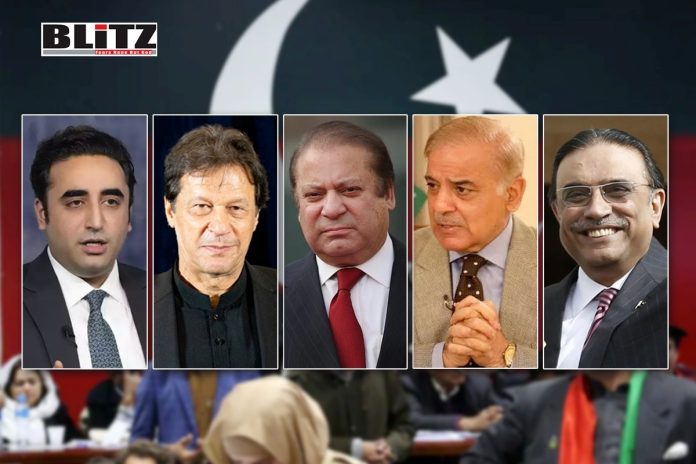Pakistan stands at a critical juncture, embroiled in a whirlwind of political turmoil following the recent elections, an electoral process fraught with allegations of rigging, manipulation, and institutional interference. What was anticipated to be a watershed moment for Nawaz Sharif’s triumphant return to the political arena has instead unfolded as a protracted saga of intrigue, power struggles, and shattered expectations.
The electoral landscape, once presumed to be firmly under the sway of Sharif’s Muslim League and the formidable Bhutto-Zardari dynasty’s Pakistan Peoples Party, now finds itself reshaped by the unforeseen ascent of Imran Khan’s Pakistan Tehreek-e-Insaf (PTI). Despite concerted efforts by the military, commonly referred to as the establishment, to stymie PTI’s burgeoning momentum, the party has emerged with a commanding majority in the national assembly, confounding even the most astute political prognosticators.
The military’s multifaceted machinations against Khan and PTI, ranging from judicial interventions to even meddling in the personal affairs of the PTI leader, failed to derail PTI’s electoral surge. However, the aftermath of the election has unfurled a sordid tapestry of subterfuge, with allegations of widespread rigging and seat manipulation casting a pall over the legitimacy of the electoral outcomes. Gohar Ali Khan, a prominent figure within PTI’s ranks, vociferously contends that the party clinched a substantial number of seats, only to have them unjustly redistributed to its rivals through surreptitious means.
In the midst of this chaos, a fleeting beacon of integrity emerged as a Karachi-based politician voluntarily relinquished his seat, decrying the electoral malfeasance that propelled him to victory. Yet, such acts of conscientious dissent are rare commodities in a political landscape beset by entrenched vested interests and Machiavellian stratagems.
Further complicating an already convoluted scenario is Maulana Fazlur Rahman’s bombshell revelation implicating top military brass in orchestrating the concerted campaign against PTI. His damning allegations have sparked a veritable firestorm of denials and recriminations among erstwhile allies, exacerbating the pervasive sense of distrust and betrayal that pervades Pakistani politics.
As weeks transpire without the formation of a viable government, Pakistan teeters perilously on the precipice of a constitutional crisis. Nawaz Sharif’s grandiose ambitions have been tempered, precipitating a recalibration of power dynamics within his party, with his brother Shehbaz Sharif emerging as a potential prime ministerial candidate amidst the tumultuous aftermath of the election. Meanwhile, the Bhutto-Zardari faction, harboring aspirations of catapulting Bilawal Bhutto-Zardari into the premiership, grapples with its own internecine power struggles.
In the absence of a clear electoral mandate, political parties engage in frenzied negotiations, desperately seeking to cobble together a fragile coalition government. However, the specter of PTI’s resurgent return to power looms ominously large, threatening to upend the delicate equilibrium of political forces and plunge the nation into further chaos and uncertainty.
PTI’s unyielding demand for the restoration of its purportedly pilfered seats only serves to stoke the flames of discord, exacerbating an already volatile political climate. The military, ensnared in a morass of allegations implicating it in electoral manipulation, finds itself under intense scrutiny, with poignant parallels drawn to past interventions that precipitated cataclysmic national crises.
Despite overtures from the military for a potential compromise solution, PTI remains resolute in its refusal to entertain alliances with its erstwhile adversaries, buoyed by the unwavering support of its grassroots supporters and steadfast in its insistence on rectifying the electoral injustices and assuming its rightful place at the pinnacle of governmental authority.
In figures such as Gohar Ali Khan and Ali Amin Gandapur, PTI possesses articulate standard-bearers who embody the party’s unwavering resolve in the face of adversity. Imran Khan’s astute nomination of Omar Ayub Khan, a scion of Pakistan’s political aristocracy, underscores PTI’s newfound confidence and heralds a departure from ossified power structures, signaling a commitment to ushering in a new epoch of transparent and accountable governance.
Yet, beneath the veneer of surface tumult lies a deeper malaise afflicting Pakistan’s body politic: the pernicious and enduring influence of the military in shaping the nation’s democratic trajectory. From the shadows of Iskandar Mirza and Ayub Khan’s fateful coup d’état to the present day, the long and looming specter of the military casts a profound pall over Pakistani politics, undermining the foundational principles of democracy and accountability.
As the nation grapples with the fallout from a deeply flawed electoral process, the onus falls squarely upon Pakistan’s hallowed institutions to safeguard the sanctity of democracy, restore faith in the electoral process, and pave the arduous path toward national reconciliation and renewal. Failure to address these systemic fissures risks consigning the nation to the throes of perpetual turmoil and thwarting the collective aspirations of millions of Pakistanis for a brighter, more equitable future.




